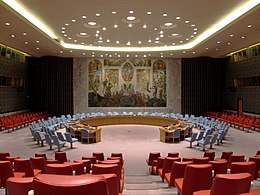The United Nations Organization (UNO) or simply United Nations (UN) is an international organization whose stated aims are facilitating cooperation in international law, international security, economic development, social progress, human rights, and achievement of world peace. The UN was founded in 1945 after World War II to replace the League of Nations, to stop wars between countries, and to provide a platform for dialogue. It contains multiple subsidiary organizations to carry out its missions.
There are currently 192 member states, including nearly every sovereign state in the world. From its offices around the world, the UN and its specialized agencies decide on substantive and administrative issues in regular meetings held throughout the year. The organization has six principal organs: the General Assembly (the main deliberative assembly); the Security Council (for deciding certain resolutions for peace and security); the Economic and Social Council (for assisting in promoting international economic and social cooperation and development); the Secretariat (for providing studies, information, and facilities needed by the UN); the International Court of Justice (the primary judicial organ); and the United Nations Trusteeship Council (which is currently inactive). Other prominent UN System agencies include the World Health Organization (WHO), the World Food Programme (WFP), World Trade Organisation (WTO), World Bank (WB), International Monetary Fund (IMF), Intergovernmental Panel on Climate Change (IPCC) and many others.
What better platform for implementing World Governance? If that IS the plan.

UN General assembly
Deliberative assembly of all UN member states

- May resolve non-compulsory recommendations to states or suggestions to the Security Council (UNSC);
- Decides on the admission of new members, following proposal by the UNSC;
- Adopts the budget;
- Elects the non-permanent members of the UNSC; all members of ECOSOC; the UN Secretary General (following his/her proposal by the UNSC); and the fifteen judges of the International Court of Justice (ICJ). Each country has one vote.
UN Secretariat
Administrative organ of the UN

- Supports the other UN bodies administratively (for example, in the organization of conferences, the writing of reports and studies and the preparation of the budget);
- Its chairperson – the UN Secretary General – is elected by the General Assembly for a five-year mandate and is the UN’s foremost representative.
UN Security Council
For international security issues

- Responsible for the maintenance of international peace and security;
- May adopt compulsory resolutions;
- Has fifteen members: five permanent members (China, France, Russia, UK and USA) with veto power and ten elected members.
UN Economic and Social Council
For global economic and social affairs

- Responsible for co-operation between states as regards economic and social matters;
- Coordinates co-operation between the UN’s numerous specialized agencies;
- Has 54 members, elected by the General Assembly to serve staggered three-year mandates
International court of Justice
Universal court for international law

- Decides disputes between states that recognize its jurisdiction;
- Issues legal opinions;
- Renders judgement by relative majority. Its fifteen judges are elected by the UN General Assembly for nine-year terms.
UN Trusteeship Council
For administering trust territories (currently inactive)
- Was originally designed to manage colonial possessions that were former League of Nations mandates;
- Has been inactive since 1994, when Palau, the last trust territory, attained independence.
UN and a NWO
Julian Huxley (brother of Aldous Huxley, author of Brave New World) was involved in the setting up of UNESCO and an advocate of eugenics and population control. In 1946 he had this to say:
The task laid upon UNESCO of promoting peace and security can never wholly be realised to the means assigned to it – education, science and culture. It must envisage some form of world political unity, whether through a single world government or otherwise……specifically, in its education programme it can stress the ultimate need for world political unity and familiarise all peoples with the implications of the transfer of full sovereignty from separate nations to a world organisation……one other item which UNESCO should put on its programme as soon as possible is the study of the application of psycho-analysis and other schools of ‘deep’ psychology in education.
And more alarmingly he stated:
Taking the techniques of persuasion and information and true propaganda that we have learned to apply nationally in war, and deliberately bending them to the international tasks of peace, if necessary utilising them, as Lenin envisaged, to overcome the resistance of millions.


 Saving...
Saving...